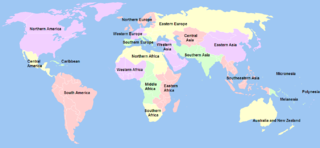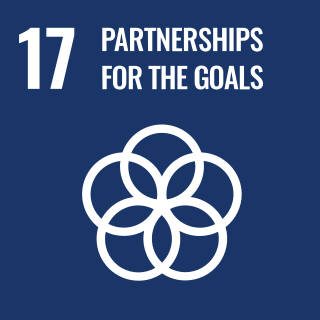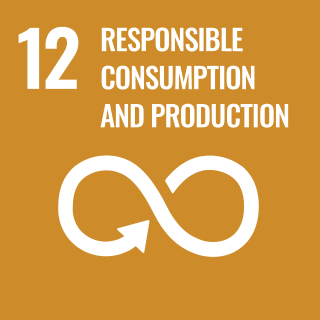Related Research Articles

The demographic profile of Cameroon is complex for a country of its population. Cameroon comprises an estimated 250 distinct ethnic groups, which may be formed into five large regional-cultural divisions:
This is a demography of the population of Anguilla including population density, ethnicity, education level, health of the populace, economic status, religious affiliations and other aspects of the population.
The United Nations Statistics Division (UNSD), formerly the United Nations Statistical Office, serves under the United Nations Department of Economic and Social Affairs (DESA) as the central mechanism within the Secretariat of the United Nations to supply the statistical needs and coordinating activities of the global statistical system. The Division is overseen by the United Nations Statistical Commission, established in 1947, as the apex entity of the global statistical system and highest decision making body for coordinating international statistical activities. It brings together the Chief Statisticians from member states from around the world.

The United Nations geoscheme is a system which divides 248 countries and territories in the world into six continental regions, 22 geographical subregions, and two intermediary regions. It was devised by the United Nations Statistics Division (UNSD) based on the M49 coding classification. The creators note that "the assignment of countries or areas to specific groupings is for statistical convenience and does not imply any assumption regarding political or other affiliation of countries or territories".

Alex Paul "Sandy" Pentland is an American computer scientist, the Toshiba Professor of Media Arts and Sciences at MIT, and serial entrepreneur.
SDMX, which stands for Statistical Data and Metadata eXchange, is an international initiative that aims at standardising and modernising ("industrialising") the mechanisms and processes for the exchange of statistical data and metadata among international organisations and their member countries.
Environment statistics is the application of statistical methods to environmental science. It covers procedures for dealing with questions concerning the natural environment in its undisturbed state, the interaction of humanity with the environment, and urban environments. The field of environmental statistics has seen rapid growth in the past few decades as a response to increasing concern over the environment in the public, organizational, and governmental sectors.

The UK Data Archive is a national centre of expertise in data archiving in the United Kingdom. It houses the largest collection of social sciences and population digital data in the UK. It is certified under CoreTrustSeal as a trusted digital repository. It is also certified under the international ISO 27001 standard for information security. Located in Colchester, the UK Data Archive is a specialist department of the University of Essex, co-located with the Institute for Social and Economic Research (ISER). It is primarily funded by the Economic and Social Research Council (ESRC) and the University of Essex.
The Ministry of Statistics and Programme Implementation (MoSPI) is a ministry of Government of India concerned with coverage and quality aspects of statistics released. The surveys conducted by the Ministry are based on scientific sampling methods.

Official statistics are statistics published by government agencies or other public bodies such as international organizations as a public good. They provide quantitative or qualitative information on all major areas of citizens' lives, such as economic and social development, living conditions, health, education, and the environment.
The Committee for the Coordination of Statistical Activities (CCSA) is composed of international and supranational organisations, whose mandate includes the provision of statistics. The CCSA promotes inter-agency coordination and cooperation on statistical programmes and consistency in statistical practices and development.

The Sustainable Development Goals (SDGs) or Global Goals are a collection of seventeen interlinked objectives designed to serve as a "shared blueprint for peace and prosperity for people and the planet, now and into the future." The short titles of the 17 SDGs are: No poverty, Zero hunger, Good health and well-being, Quality education, Gender equality, Clean water and sanitation, Affordable and clean energy, Decent work and economic growth, Industry, innovation and infrastructure, Reduced inequalities, Sustainable cities and communities, Responsible consumption and production, Climate action, Life below water, Life on land, Peace, justice, and strong institutions, and Partnerships for the goals.

Doreen Bogdan-Martin is an American diplomat and engineer, current Secretary-General of the International Telecommunication Union. She was elected at the 2022 ITU Plenipotentiary Conference in Bucharest, and as the first woman in the 157-year history of the ITU to become the Secretary-General. Previously, she was the first woman to become an Elected Official of the ITU, as the Director of the Telecommunication Development Bureau of the ITU.

Sustainable Development Goal 17 is about "partnerships for the goals." One of the 17 Sustainable Development Goals established by the United Nations in 2015, the official wording is: "Strengthen the means of implementation and revitalize the global partnership for sustainable development". SDG 17 refers to the need for the nonhegemonic and fair cross sector and cross country collaborations in pursuit of all the goals by the year 2030. It is a call for countries to align policies.

Sustainable Development Goal 12, titled "responsible consumption and production", is one of the 17 Sustainable Development Goals established by the United Nations in 2015. The official wording of SDG 12 is "Ensure sustainable consumption and production patterns". SDG 12 is meant to ensure good use of resources, improve energy efficiency and sustainable infrastructure, provide access to basic services, create green and decent jobs, and ensure a better quality of life for all. SDG 12 has 11 targets to be achieved by at least 2030, and progress towards the targets is measured using 13 indicators.

Sustainable Development Goal 11, titled "sustainable cities and communities", is one of 17 Sustainable Development Goals established by the United Nations General Assembly in 2015. The official mission of SDG 11 is to "Make cities inclusive, safe, resilient and sustainable". The 17 SDGs take into account that action in one area will affect outcomes in other areas as well, and that development must balance social, economic and environmental sustainability.

Sustainable Development Goal 7 is one of 17 Sustainable Development Goals established by the United Nations General Assembly in 2015. It aims to "Ensure access to affordable, reliable, sustainable and modern energy for all." Access to energy is an important pillar for the wellbeing of the people as well as for economic development and poverty alleviation.
References
- ↑ Del Conte, Natali. "Loaded: Digital Graffiti Archived 2008-04-04 at the Wayback Machine ." CNET TV. February 5, 2008. Retrieved on March 8, 2008.
- ↑ Henry, Alan. "Best Of The Internet (Vol.27 No.8)." PC Magazine. February 5, 2008. Retrieved on June 24, 2008.
- ↑ "UNdata Entry in re3data.org". www.re3data.org. Archived from the original on 3 March 2016. Retrieved 21 July 2014.
- ↑ "What is the UN PET Lab and why is it important? // UNSC53 Side Event — UN-CEBD". unstats.un.org. Archived from the original on 2022-10-24. Retrieved 2022-10-24.